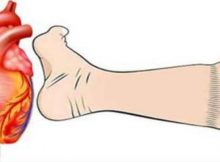Dr. Chauncey Crandall, a distinguished American cardiologist, spend decades working on prevention, minimization, and reversal of heart disease. During this period, he came to the conclusion that the heart actually warns of possible heart attack, minutes, days, and even weeks before.
These are some of the early signs of a heart attack in the near future:
Swelling
A lot of people think that swollen feet and ankles are associated with standing or sitting too much, however, heart problems can also lead to fluid accumulation and cause the legs or abdomen to swell, as well as the ankles and feet. As a result of fluid retention, some patients even gain weight and lose their appetite.
Anxiety
A lot of patients who experienced a heart attack reported feeling anxiety attacks prior to the actual moment when the attack happened. Even though people who suffer from anxiety attacks often think that they’re having a heart attack, it’s always better to be on the safe side and call 911 anyway.
Pain in other body parts
The pain usually begins in the chest and further spreads towards the shoulders, elbows, neck, jaw, arms, and even abdomen. A very common pain is the one felt between the shoulder blades or pain in one or both arms. The pain comes and goes.
Coughing
Heart failure may cause patients to cough up bloody phlegm, but also they may experience a nagging or wheezing cough. This is caused by a fluid deposit in the lungs.
Now, let’s take a look at some more traditional symptoms of heart attack:
Discomfort in the chest
Shortness of breath
Cold sweats
Lightheadedness
Nausea
IMPORTANT TO NOTE: Never ignore the signs in hope that they will go away. If they last for more than 5 or 10 minutes, don’t hesitate and immediately call an ambulance or have someone drive you to the ER. You can also take an aspirin, unless you’re allergic to it.





